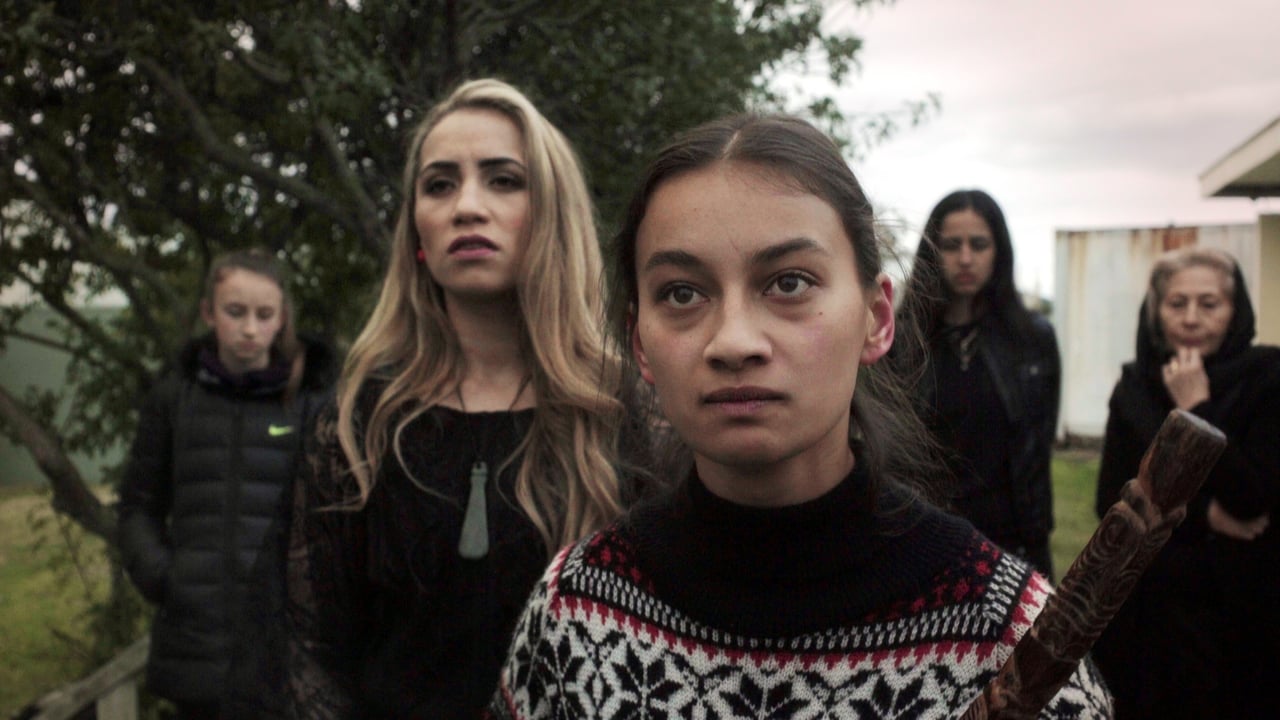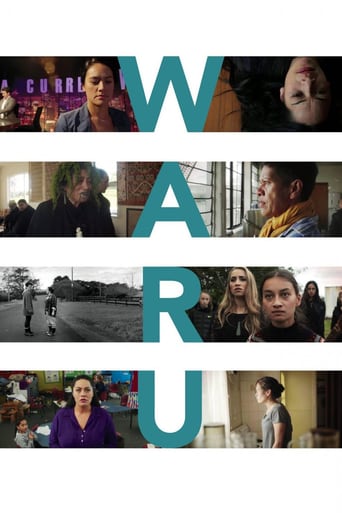Nonureva
Really Surprised!
Reptileenbu
Did you people see the same film I saw?
Dorathen
Better Late Then Never
SeeQuant
Blending excellent reporting and strong storytelling, this is a disturbing film truly stranger than fiction
p-seed-889-188469
I wish I could be as gushing and effusive about this movie as others have been but regrettably I can't. I preface this review by expressing my admiration for those who brought Waru to fruition, be they the directors, actors or the many unsung talents that are necessary to bring a movie to life. I have no doubt that each of them was thoroughly dedicated to bringing the message of child abuse to the World. But however talented these people may be as individuals as a group they failed miserably for some very simple reasons.Waru is a movie made by a "sisterhood" of 8 directors according to set of "non-negotiable parameters - they had to have a female Maori lead, the story had to connect to the death of a child, all the stories had to take place within the same 10-minute timeframe, and the vignette would be one continuous shot". In other words Waru was made by a committee who take a heart breaking and important subject and treat it like an assignment for "Film making 101". Now if Waru was a comedy, or about something as innocuous as say baking a pie, we might think, well, that's weird but given the nothingness of the subject we will allow it. But Waru is not about baking a pie, it is about what is probably the most tragic subject in any race's world and therefore the decision to dilute and subjugate that message to personal vanity is almost sickening. "Waru" the movie is so clever it barely even mentions Waru the victim or what happened to him and it sheds no light on what the problem might be or what we might do to make it go away. Indeed if you had not read the publicity blurb beforehand you would probably not have the faintest idea what Waru was about. Subtle, intelligent, cutting edge filmmaking you may say? No, just pretentiousness and an insult not only to the viewer's intelligence but more importantly to the children who continue to die but which these filmmakers chose to push to a poor second place behind satisfying their own intellectual vanity. Even the choice of the child's name "Waru, meaning 8 in Maori, is in poor taste, denying the victim an individual personality and instead replacing it with that of the "sisterhood".It is easy to see how this might have happened. Waru was made very quickly on a shoestring budget and the decisions that were made may have been the best of a bad lot. To be honest its makers deserve huge respect just for finishing a movie, any movie, good or bad. Maybe the deliberately imposed "rules" were imposed by the films funders. But for all that if you can't make the film you want to make with the resources you have, then maybe it is a better choice to make another film.But, for whatever reason, the decision was made to make the film within this framework, totally nobbling Waru to the point of immobility and rendering it a total mishmash of nothingness. I am sorry to say that the only emotion I experienced watching Waru was one of anger at seeing an opportunity wasted. The movie, we are told, consists of 8 "vignettes", vignettes being a fancy name for "fragments". If, as is debatable, this movie is supposed to have any sort of flow, the first and last "vignettes" should have been the strongest. After all you want to draw viewers in with a strong start and you want to finish with a strong ending, and hopefully a point, or at least some sort of resolution. In Waru the first and last vignettes are in fact the weakest, not because they are poorly made, but because given the ridiculous "Film making 101" constraints that must be followed, it is inevitable. At least two of the other "vignettes" appear to be totally irrelevant to Waru's story. Two "vignettes" have more interest than the rest but this interest is not in the least related to the "story" of Waru, if such a story actually exists. One is interesting because it shows a part of Maori culture that many non-Maori will be unfamiliar with, the other for the superb young actress who will someday be a star. I presume it is on the strength of her performance that she appears to be the poster girl for Waru in the trailer and promotional paraphernalia.
I repeat again, there was a lot of talent involved in Waru but for all its good intentions it was hoist by its own petard. Every single one of the 8 directors could have, in isolation, made a "Waru" hundred times better than the one that was made by the group. I look forward to seeing one of these movies in due course.
Red Haircrow
It is entirely too easy for anyone to rate films like this. Rate them low or mediocre, to critique on the child actors who have only a few seconds on screen, to try to say indigenous peoples used clichés about themselves (patently absurd because it is self-knowledge not a stereotype), the sound levels or camera angles. Not that there might not be legitimate technical complaints in a film such as this. I am not from the community of the main peoples portrayed, but I am a person of color with indigenous heritage, who has researched, live and learned more than average of accurate history and the connection of things like invasion, colonization, forced assimilation and appropriation and how it affected the native populations. So much of the western society are oblivious to this reality or they downplay it with derision as they live on land that was stolen. Places where the Original peoples still struggle, not because they are monolithic or incapable, but because they were profoundly interrupted by Europeans then, if surviving genocide, now live with discrimination, stereotyping on in their own land but where everything around them, from lessons taught in school or the cabbie who makes this pay first unlike white customers, is strategically or inadvertently made to lessen them. Most do not see how all of these things are interconnected, and the dysfunctions, the abuses, the deaths while not directly their fault, they benefit from and their presence and willful privilege minimizes. And so, when a profound story is told from an indigenous perspective, unless it somehow reaches or emulates a Euro-created interpretation of indigenous issues, it is deemed passé, always compared to a baseline of Eurocentricity. The series of short films are terrific in it's portrayal of the ranges of reactions to the death of a small boy of a very interconnected and interactive community. Such an unfortunate event can occur in any community around the world, any social level, but this gain insight into a Maori community with the complexity of needs, accents, prejudices and posturing...or complete honesty that happen in the aftermath of such a tragedy. Take with empathy, respect what the director and participants, which although a fictional film, draws from deeply personal, painful experiences. But that doesn't matter just like my review, and basic entreaty to be empathetic and a Human Being. A message of indigenous reality to mainstream Euro-ruled society in places like the US and New Zealand, which needs to nbe heard and understood, is too often rejectedor minimized because of having privilege to ignore it or use terms like "awful cliché", when that shows they do not even understand the difference when someone from WITHIN a community presents themselves as they see it, and when someone not from that community, like non-indigenous use a stereotype to describe the indigenous.
campbellp66
Waru has been lauded as a great New Zealand film, but that's an oversimplification and you need to be prepared for the practicalities. It is eight connected short films, with different writers, directors and performers in each. That has the inevitable consequence of producing eight very different pieces, some of which are superb.I went into Waru knowing what the central event was, so expected it to be tough to watch and it was, though, at times, that was more about the variation in quality on the screen than the topic. It is important to provide opportunities to make films, how else will people learn? What's unusual here is that we see intelligent, beautifully crafted work alongside writing and or performances that were genuinely disappointing. The contrast between some shorts was jarring. Should you go and see Waru? Absolutely, yes. Will you have to forgive it periods of awful cliché and direct exposition in the mouths of characters? Yes. Does it redeem itself with simplicity, complexity, honesty, courage, power and leave you with a haunting personal challenge? Yes.

